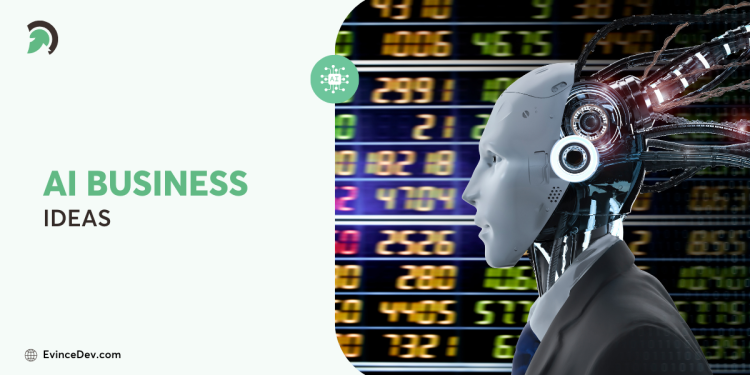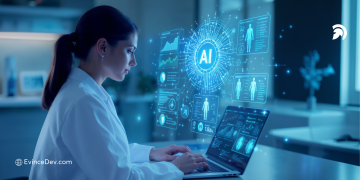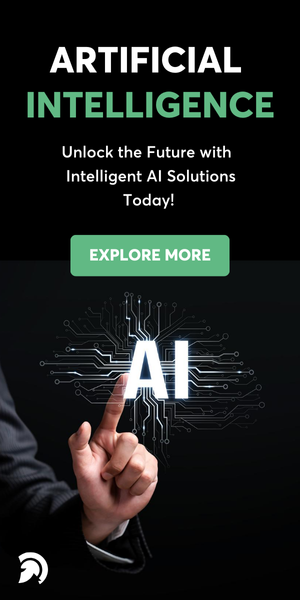Artificial intelligence (AI) has gained wide acceptance in business in recent years. Many companies are aggressively using AI in startup ideas. It can be used as a complete solution for various projects and integrated into business software systems.
Such an approach showcases how flexible AI is. It is a customized tool that improves overall operational efficiency across several domains and addresses the organization’s demands.
The current trends highlight the development of AI technologies and their consistent integration with modern business plans. Although it encourages innovation and smoothens processes.
Every entrepreneur continues to look for AI business ideas to get into the fast-growing technology industry. Even if AI has established itself as a technology that draws growth and popularity.
Let’s look at the current situation of the AI market. And realize how many profitable prospects AI development offers before discussing exciting AI business ideas to start.
Stats on AI Market Structure
- A Gartner Survey predicts that by 2025, the market for AI software will be worth around $135 billion. With a CAGR of 14.4% to 31.1% from 2021 to 2025, the growth will exceed in the industry.
- According to a new EY report, businesses worldwide are increasingly experimenting with AI.
90% of tech leaders surveyed said they are looking for AI platforms like ChatGPT and Bing Chat. And 80% said they will invest more in AI in the coming year.
- A McKinsey & Company analysis shows that generative AI will deliver new efficiencies to several industries. The impact of AI on efficiency is expected to be between $2.6 trillion and $4.4 trillion a year.
Top Profitable AI Business Ideas To Look For In 2026 & Beyond
Within the ever-changing digital world, AI has emerged as a force that propels businesses to uncharted territories of success. Let’s examine several AI business opportunities for startups with maximum ROI.
1. AI-Based Retail Assistance Solution
It envisions retail revolutionized using AI systems that provide personalized recommendations grounded on individual preferences and buying history while optimizing inventory management through predictive analytics.
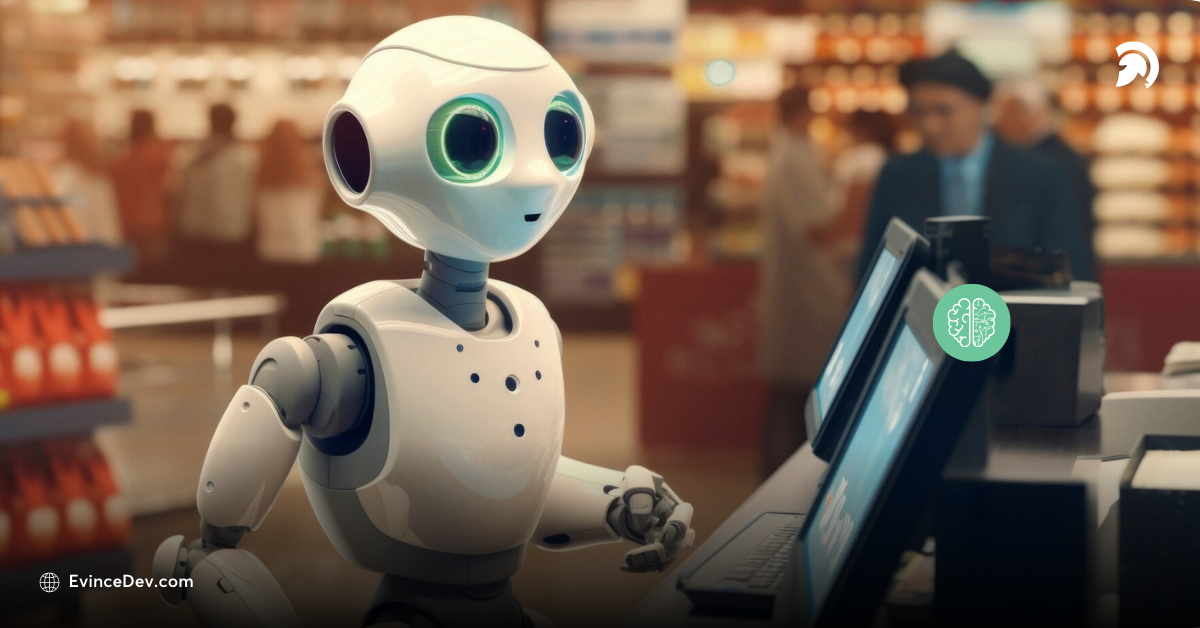
In addition, these solutions perform real-time analysis of big data sets. They enable retailers to make informed decisions, reduce costs, and improve customer experiences.
Using AI-powered chatbots integrated into customer service enhances the shopping experience by providing instant help to all doubts expressed.
The smooth incorporation of AI technologies increases operational efficiencies. It promotes closer ties between customers and suppliers based on personalized experiences and responses. Therefore, it drives growth in the competitive retail environment.
2. Develop AI Generated Content Detector Software
As the digital world expands, so does the threat of manipulated content, undermining trust and authenticity. Creating AI-powered content detection software requires sophisticated algorithms adept at spotting deep fakes, image alterations, and synthetic media.
This on-demand technology is essential for media outlets, social platforms, and news agencies in the battle against misinformation. It safeguards credibility and ethical standards in content distribution, serving as a bulwark against the erosion of trust.
Organizations can deploy custom software development services to create tailored AI-powered content detection tools that meet their specific needs. These tools can help uphold transparency and accountability, reassuring audiences and stakeholders. In a landscape rife with digital manipulation, such innovations fortify the integrity of information dissemination and promote a more informed and discerning society.
3. AI-Powered Logistics and Supply Chain Management Solution
AI-driven solutions are composed to revolutionize the logistics and supply chain sector, offering many advantages.
The system excels in optimizing delivery vehicle routes, automating warehouse tasks through robotics, and facilitating predictive maintenance for equipment.
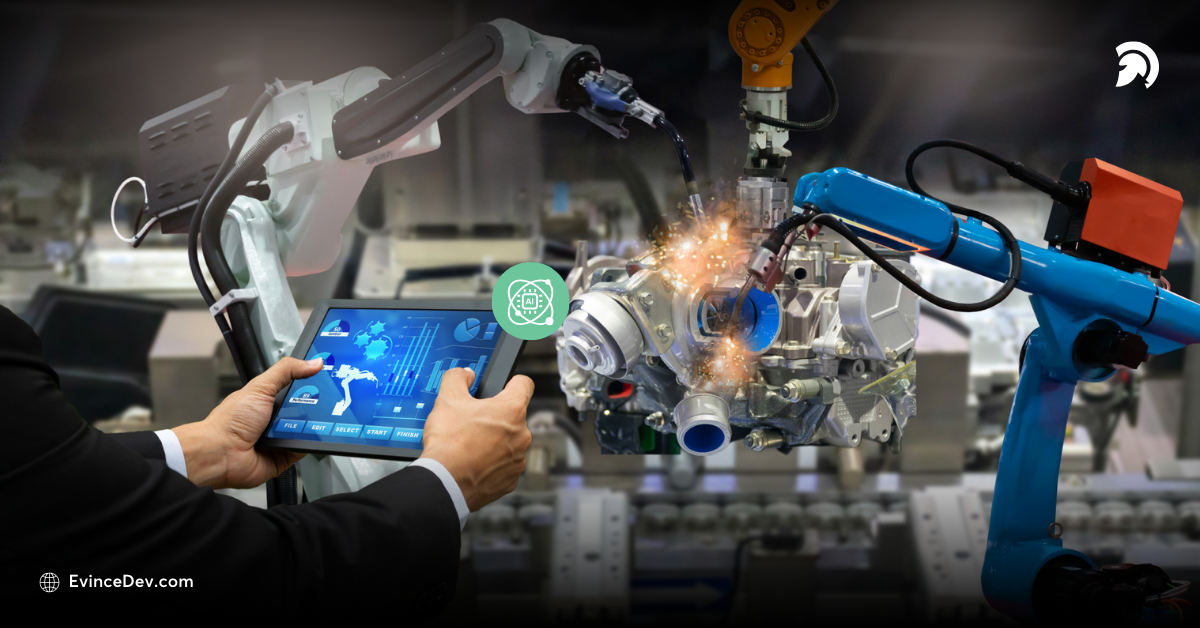
By utilizing AI technologies, businesses can achieve heightened operational efficiency, cost reduction, and enhanced supply chain visibility and resilience.
Such advancements streamline processes and enable companies to adapt swiftly to market dynamics, customer demands, and unforeseen disruptions.
AI integration ensures a competitive edge by enabling faster decision-making, proactive problem-solving, and strategic resource allocation.
Adopting AI in logistics and supply chain management indicates a future of streamlined operations, customer satisfaction, and sustainable business growth.
4. AI-Based Marketing App
AI-based marketing apps are set to transform marketing by utilizing data analytics, natural language processing, and predictive modeling. Integrated with mobile app development, such tools personalize marketing campaigns, optimize ad placements, and analyze consumer behavior.
Automating repetitive tasks and offering actionable insights enables businesses to boost conversions, improve customer engagement, and maximize ROI. Such revolution isn’t just about efficiency; it’s about enhancing the quality of interactions between brands and customers.
With AI, marketing becomes more targeted, relevant, and responsive to individual preferences and needs. It drives business growth and boosts more robust, meaningful connections with consumers.
5. Build AI-Based Automobile Solutions
The automotive industry is revolutionizing, adopting AI-powered innovations that span autonomous driving, predictive maintenance, vehicle diagnostics, and intelligent navigation.
However, AI allows vehicles to process live data from cameras and GPS, make decisions, ensure safety, and fine-tune performance.
Such technological leap also fuels the rise of connected vehicles, innovative mobility services, and sustainable transportation ecosystems. Hence, it is shaping a future where cars seamlessly integrate with digital infrastructure.
The synergy between AI and automobiles isn’t just about driving efficiencies. It is a catalyst for redefining how people perceive and interact with transportation. It indicates an era of innovative, safer, and more environmentally conscious mobility solutions.
6. Create AI-Powered Virtual Health Assistance
AI-driven virtual health assistants are revolutionizing healthcare by delivering tailored medical advice, remotely tracking patients, and enabling telehealth consultations.
Its assistants examine medical data, flag irregularities, and notify healthcare professionals of potential concerns in real time.
Their ability to automate administrative duties and boost patient involvement streamlines healthcare delivery, cutting costs and strengthening patient results.
Furthermore, virtual assistants are accessible 24/7, providing continuous monitoring and support for patients managing chronic conditions.
They can offer reminders for medication schedules, lifestyle adjustments, and follow-up appointments. It ensures patients stay on track with their healthcare plans.
7. AI-Driven Cybersecurity App
As cyber threats evolve, AI-driven cybersecurity apps play a critical role in proactively detecting and responding to all complex challenges.
AI-driven cybersecurity solutions are revolutionizing threat detection & response by leveraging ML, behavioral analytics, & predictive modeling to identify & neutralize cyber threats in real-time.
— Rob Lowe Is Marketing (@roblismarketing) April 19, 2024
Its applications use advanced machine learning algorithms to detect anomalies, pinpoint potential vulnerabilities, and swiftly mitigate real-time risks.
They learn from new data patterns & evolve alongside emerging threats, providing robust protection for sensitive data, networks, and systems. The proactive approach enhances security and allows organizations to stay ahead of cyber adversaries.
By employing AI technologies, cybersecurity teams can improve their efficiency and effectiveness in safeguarding digital assets. It ensures a resilient defense against the ever-evolving world of cyber threats.
8. AI-Based Education Platform
Education is experiencing a digital revolution, with AI-based education platforms leading the charge. Such platforms provide tailored learning experiences using adaptive algorithms, intelligent tutoring systems, and automated assessments.
They analyze student data to pinpoint learning deficiencies and offer personalized content for improved outcomes. AI-driven education tools also promote collaboration, feedback loops, and progress monitoring, enhancing accessibility, engagement, and efficacy in learning.
Likewise, they enable educators to create interactive simulations, virtual reality experiences, and gamified lessons, further enriching the learning environment.
Therefore, AI platforms facilitate real-time analytics and predictive modeling, enabling educators to make data-driven decisions and optimize teaching strategies.
9. AI-Based Smart Financial Services
Financial institutions can use AI Fintech platforms to provide tailored financial services that meet customer needs and preferences.
Such services encompass AI-powered chatbots for customer support, automated investment advice, fraud detection algorithms, and customized financial planning tools.
AI’s predictive abilities allow financial firms to make informed decisions, manage risks effectively, and improve customer satisfaction and loyalty.
By utilizing AI technologies, institutions can enhance financial prediction accuracy and offer personalized experiences that resonate with individual clients.
AI integration optimizes internal processes and boosts a deeper understanding of customer behaviors. Hence, it enables financial institutions to adapt & innovate in a rapidly evolving industry landscape.
10. Launch Your AI-driven Fraud Detection Firm
Establishing an AI-driven fraud detection firm can address the growing challenges of fraud across industries.
Your firm can help businesses detect and prevent fraudulent activities by developing sophisticated AI algorithms. It is helpful for anomaly detection, pattern recognition, and behavior analysis.
Offering scalable and customizable fraud detection solutions can safeguard businesses from financial losses, regulatory penalties, and reputational damage. It will boost trust and integrity in the marketplace.
Employing AI technologies can enable real-time monitoring and proactive risk management, providing businesses with insights to mitigate potential threats.
Moreover, your firm can also enhance regulatory compliance by implementing AI-driven solutions that ensure adherence to industry standards and regulations.
11. AI-Powered Real Estate Solution
AI tools are invaluable for real estate professionals, revolutionizing property management, market analysis, and customer relations.
Such tools provide predictive analytics for accurate property valuations and client interactions and optimize listings for precise marketing strategies.
Employing AI algorithms enables real estate firms to boost operational efficiency, increase sales, and offer tailored services to clients.
Clearly, such advancements streamline daily tasks and enable professionals to make data-driven decisions, anticipate trends, and stay competitive.
In fact, adopting AI in real estate can enhance productivity and customer experiences and sustain growth in the industry.
12. Revolutionizing Pharmaceuticals with AI
The pharmaceutical industry is harnessing AI to innovate drug research, clinical practices, and healthcare delivery. AI expedites drug discovery by analyzing complex datasets to identify potential therapies, cutting costs and time.
It refines clinical trials by improving patient matching and real-time monitoring of outcomes. AI also enhances personalized medicine by leveraging patient data for customized treatment approaches.
On the operational front, AI-driven tools optimize manufacturing processes, ensure precise supply chain management, and maintain compliance with regulations. The result is a more efficient, patient-centric approach, pushing the boundaries of pharmaceutical advancements and healthcare accessibility.
13. AI-Based Chatbot Development
AI-powered chatbots are transforming customer service and engagement in various industries. Such bots offer personalized assistance and resolve issues instantly using natural language processing, sentiment analysis, and machine learning.
Besides, they excel in handling diverse inquiries, from suggesting products and tracking orders to providing technical support.
AI-driven chatbots boost satisfaction, increase sales, and enhance business operational efficiency by streamlining customer interactions and cutting response times.
Furthermore, AI-driven chatbots continuously learn and adapt, ensuring they stay up-to-date and deliver increasingly practical support over time.

13. AI Content Generation Tool
Artificial intelligence (AI) solutions for content creation have the potential to completely transform the content production process and enable companies to easily, quickly, and massively produce high-quality content. Content makers can save time and resources by using these Generative AI tools to assist with a variety of content needs, such as writing articles, creating graphics, and making videos.
Businesses who wish to match the growing need for good content can invest profitably in AI content development, as the content marketing market is expected to reach $69.8 billion by 2030. They rank among the best AI and machine learning company concepts of the past ten years as a result.
How Do Generative AI Startups Make Money?
Generative AI startups employ trending AI startup ideas to monetize their technology using any startup app development company. Here’s an explanation of how each of such strategies contributes to their profitability:
- Data Sets: Generative AI startups ideas often create and curate high-quality datasets crucial for training their AI models. They can monetize datasets by selling access to researchers, businesses, and organizations requiring reliable data for their AI projects. Thus, the value lies in the data’s quality, diversity, and relevance, which can be tailored to specific industries or applications.
- AI Consulting and Professional Services: Such startups can offer AI consulting services to businesses seeking to integrate generative AI solutions into their workflows. It includes providing expertise in model development, customization, deployment, and ongoing support. Next, by employing generative AI technologies, startups can offer insights and solutions that help clients achieve their objectives.
- Domain Expertise: Generative AI startups often specialize in specific domains such as healthcare, finance, or more. They can monetize their domain expertise by developing customized AI solutions tailored to all sectors’ unique challenges and requirements. Clients are willing to pay for expertise that delivers tangible benefits and competitive advantages in their respective industries.
- Licensing AI: Startups can license their generative AI models and algorithms to other companies for commercial use. Although it can be software licenses, subscriptions, or royalty agreements based on usage or revenue generated. Licensing AI allows startups to scale their technology reach without directly managing the implementation or maintenance for each client.
- Partnerships & Collaborations: Generative AI startups can generate lucrative revenue streams by collaborating with established companies, research institutions, or other startups. However, partnerships can involve joint development projects, co-branded solutions, or revenue-sharing agreements. Afterward, startups can grow their customer base and drive mutual growth by utilizing complementary strengths and resources.
Case Study: Transforming Retail with AI – Qopius
Qopius is an innovative AI-based project that focuses on reshaping the retail landscape. By employing AI for product recognition, inventory management, and user experience enhancements, Qopius is creating the way for a digitally driven and efficient retail ecosystem.
EvinceDev played a crucial role in integrating various functionalities and enhancing the platform’s efficiency.
Key Achievements and Platform Highlights
- Real-time Inventory Management: Qopius achieved real-time inventory tracking, enabling retailers to restock out-of-stock products promptly.
- Efficient Product Recognition: The AI-powered engine accurately identifies and categorizes products from images, streamlining shelf management.
- Interactive User Experience: The platform delivered a seamless and intuitive shopping experience by integrating color frames, charts, and lazy loading.
Explore more of our AI solutions development services, showcasing the transformative impact of AI and technology across diverse industries and domains.
Final Takeaway
In conclusion, AI startup ideas for 2026 are abundant and varied, covering numerous industries and areas of innovation. From healthcare to logistics, cybersecurity to marketing, AI can revolutionize how people live, work, and interact with the world.
As technology advances, there has never been a better time to explore the possibilities for AI-based entrepreneurship.
If you’re ready to start this exciting journey, build an AI app with the help of an AI app development company. It will unlock new possibilities and drive meaningful impact in the digital era.
The team at EvinceDev, an artificial intelligence services provider, helps business owners transform their unique AI business ideas into reality.
So, book a Free Consultation to discuss your idea and discover what the future has in store for you!
